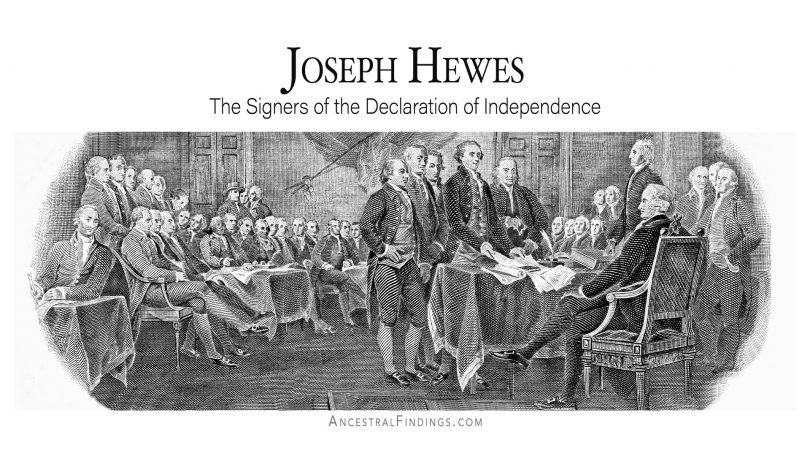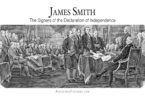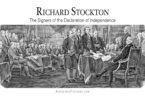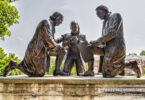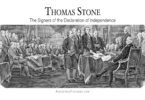Joseph Hewes is a little known signer of the Declaration of Independence. Since most people have not heard of him, it is time his story was told. Joseph was born in 1730 in Princeton, New Jersey to a Quaker family. Even at the time, he was born, his family already had solid roots in New Jersey going back three generations on his mother’s side, and four generations on his father’s side. This was pretty extraordinary for a colony that had only been settled by Europeans for about a century.
As might be expected of a Princeton native, Joseph attended Princeton University. Interestingly, though, there are no records of him graduating. This doesn’t mean that he didn’t, just that no records exist of it. So, we don’t know whether he actually graduated from Princeton or not. What we do know is that after leaving Princeton, Joseph was apprenticed to a merchant, and later became a highly successful merchant himself. Once he struck out on his own after his apprenticeship, Joseph established an excellent reputation for himself in the merchant business, and this reputation helped him to not only earn a comfortable living at his trade but also eventually paved the road that led him to become one of the signers of the Declaration of Independence.
Breaking with long established family tradition, Joseph moved away from New Jersey when he was thirty years old, and went to North Carolina, settling in the town of Edenton. Even as a newcomer to town, his personal charm and honorable conduct in business swiftly won over his new neighbors. Joseph’s ability to be well-liked and trusted by those who knew him led to him being elected to the North Carolina colonial legislature only three years after he moved there.
Joseph served several terms in the legislature before setting his sights on being sent to the Continental Congress. Unlike many of the signers, who ended up at the Congress by chance, Joseph actually had the ambition to be appointed to go there. The scene was set for Joseph to be in the Congress in 1773 when the majority of the citizens of North Carolina supported independence. The following year, Joseph was elected to be a representative from North Carolina to the Continental Congress. His selection was because of his activism on behalf of the cause of independence. Joseph’s activism for independence appealed to citizens of other states, as well, making him a popular member of the Continental Congress at that time.
Initially, Joseph had not been in favor of independence, but by listening to his constituents who supported it when he served in the North Carolina colonial legislature, he was brought around to support the cause, as well. Once he put his support behind the idea, Joseph was all-in on independence and supported it enthusiastically.
Most of the people in the colonies wanted independence. The Loyalists who were against it were a minority. Yet, Joseph found that being in favor of independence initially made him a part of the minority at the Continental Congress. When he first arrived and would speak of independence, quite a few of his colleagues mocked him, laughed at him, and even scolded him for his pro-independence position. Even as late as 1775, two-thirds of the members of the Congress opposed independence, and thought reconciliation with the Crown was still possible. Therefore, whenever Joseph would try to speak at the Congress, other members often interrupted him. While he didn’t get to speak much at the Congress, he did serve on several important committees there, and these committees were mostly pro-independence.
Joseph was a Quaker, and Quakers are traditionally pacifists, even in Joseph’s time. The fact that Joseph was in favor of war to obtain independence set him apart from most Quakers of the time, and he was also one of only a handful of Quakers at the Continental Congress. Interestingly, at a time in Quaker history where breaking from Quaker principles on any matter could get one thrown out of the church and shunned by their family, there is no indication that Joseph ever left the Quaker church, and no record of the church disowning him. Joseph also kept close ties to his family, visiting his mother whenever he could, despite the fact that she was a Quaker minister. In his will, he left large sums of money to his Quaker relatives and to different Quaker institutions.
At the beginning of 1776, Joseph was appointed by the Continental Congress as the Secretary of the Naval Affairs Committee. In this position, John Adams later said that Joseph Hewes personally laid the foundations of what would become the American Navy. In fact, Joseph is considered one of the greatest military leaders in American history, along with George Washington.
Joseph earned the historic distinction. When he was first appointed to his Naval position, he was presented with a Navy that was not at all equipped to take on the superior British Navy. To put the American Navy against the British one would have been ridiculous. To make the American Navy a more worthy adversary for the British one, Joseph personally paid to supply the American Navy with clothes and weapons, and gave the use of his personal fleet of merchant ships to be re-purposed as Navy ships. He also personally chose the most capable men to command those ships. The famous John Paul Jones is one of the men Joseph Hewes selected to captain one of his ships, in fact.
Once the Declaration of Independence was written and Joseph had signed it, he went home to New Jersey, instead of North Carolina because he was in poor health by that time, and he wanted to be near his family. Joseph never married or had children, so he wanted to be near his relatives who knew him. Joseph died in 1779, just slightly before his fiftieth birthday. The entire Continental Congress came to his funeral, and all mourned him a great deal, commenting on the great loss that the country had suffered. Joseph was buried at the Christ Church Burial Ground in Philadelphia, Pennsylvania. As he was so influential during his own time, it is a shame that Joseph is not more remembered today.

